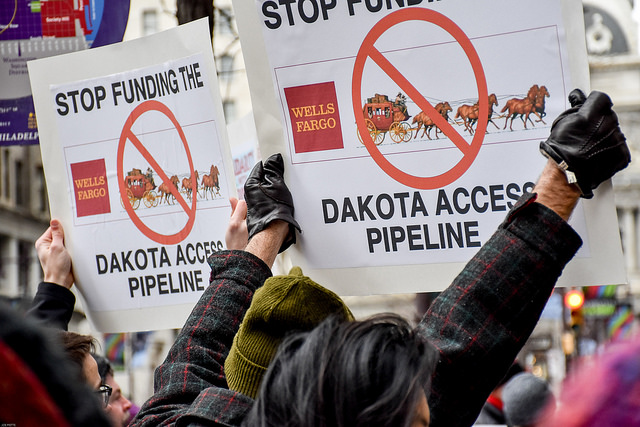Blog
We First 5: Uber Scandals, Oscar Ads, and Standing Rock

Consumers are taking the lead in persuading corporations to align their business practices and brands with positive social and environmental transformation. Widespread use of social media and increased transparency through the internet is empowering consumer activism against companies that overlook the greater potential value they can get from long-term contributions toward making a better world for limited short-term profits.
The Standing Rock Sioux tribe started a movement to encouraging people to pull their money out of banks financing the Dakota Access Pipeline and have been using the #DefundDAPL hashtag to spread the word on the web. So far, over $67 million has been divested. What’s more is that cities like Seattle, Santa Monica and others have ended their ties with Wells Fargo, one of 17 banks backing the project. Additionally, an investors group representing over $650 billion in assets under management sent a letter to the banks behind the DAPL encouraging them to work with the Standing Rock Sioux to find an agreeable solution, citing concerns over financial risk and public reputation.
This movement speaks to consumers’ power and mounting desire for purposeful companies. Now more than ever consumers are voting with their voices and their pocket books for companies they believe in and against those that don’t support their values.
The movement offers three essential lessons that every brand should take stock of to build consumer goodwill, loyalty and ultimately profits.
1. Be transparent and accountable: Today governments and companies are finding it nearly impossible to manipulate the truth or to make decisions that others perceive as selfishly motivated – at least not without engendering pushback from informed and angry citizens. In all fairness, some banks like Citi Group responded to consumer and shareholder complaints by issuing public statements discussing the conflict between their commitment to clean energy and tribal nations and their obligation to Energy Transfer to uphold their financing agreement. However, to strengthen your brand you want consumers to send you letters of encouragement about your purpose-driven business decisions, not letters of disapproval about how your actions may harm people or planet. Corporate self-interest must be moderated by dialogue, transparency, authenticity, accountability, interactivity, community, and collaboration.
2. Invest in purpose: Consumers want a better world, not bigger pipelines. To build and strengthen your stakeholder community you need to reengineer the foundational principles of capitalism to honor not only profit but purpose. In a move that illustrated its commitment to upholding its reputation and values, Norway’s biggest bank, DNB, divested from the Pipeline after heeding complaints from consumers, activists and investors. Companies that marry profit with purpose in such a way that every dollar made creates a positive social and environmental impact will be rewarded with long-lasting consumer relationships that will ultimately drive business success.
3. Inspire Consumer Advocacy: Social media empowers citizens to form large collective groups that inspire social activism. Consumers can now easily expose bad corporate behavior by raising their voices in protest or reward purpose-driven brands with purchases, referrals and recommendations. The #DefundDAPL movement is an excellent example of how consumer activism is pushing the purpose needle and shifting large sums of capital as well as bringing media attention to companies’ social and environmental impact.
Consumers are using the tools of new media to engage in dialogue with the brands they do business with and now have the power to shape social and corporate storytelling. If your brand is going to foster long-term consumer goodwill, loyalty and trust you must partner with consumers, non-profits, philanthropists and government to build a better world, which in turn will grow your bottom-line.
Connect with We First!
Twitter: @WeFirstBranding
Facebook: WeFirst
LinkedIn: WeFirst
Youtube: WeFirstTV
Join our mailing list and invite Simon to speak at your next event or meeting.

We First 5: Uber Scandals, Oscar Ads, and Standing Rock

Purpose At Work: How Wells Fargo Is Leveraging Purpose To Build Its Reputation

Top 17 in Purposeful Branding for 2017: The We First Year in Review

